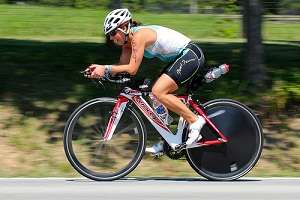Reappraisal of hydration guidelines

Surprising results of a study on dehydration and athletic performance will encourage greater analysis of the subject among the science community, according to researchers involved.
Conducted at Edith Cowan University, the study sought to better understand the precise level where dehydration begins to have a detrimental effect on athletic performance—commonly perceived to occur when the body experiences less than two per cent loss of body mass.
Using a time trial method, the study analysed the performance of 10 well-trained cyclists at different stages of dehydration and found no differences in the athlete's physical performance, heart rate, or perceptual responses.
"There is a large perceptual component, and we have been able to remove that placebo effect," says Dr Bradley Wall, lead author and lecturer at Murdoch University who says a psychological barrier was removed by blinding the participant to their hydration status.
"Everyone has told me previously that if I'm dehydrated then I'm going to go slower; subconsciously you know that," he says.
The 25km time trial required participants to cycle in a chamber that mimicked real-world conditions – including wind speed and temperature – while being intravenously kept at particular dehydration levels.
"By infusing [saline-based solution] directly into the bloodstream it not only blinded the participants on how much rehydration they were actually receiving, but also reduced some of the effects of rehydration, like gastric emptying," Dr Wall says.
By analysing rectal temperatures and heart rates during the trial, and samples of blood to measure concentrations of electrolytes, levels of chloride, sodium and potassium after the trial, the study was able to show the effects of differing levels of dehydration and rule out any possible variables.
Contrary to the hypothesis of the researchers, the time trial showed near equal results among the participants in all areas.
"We know that if people lose a significant amount of body mass there is going to be a performance decrement, but we've shown that up to less than three per cent [body mass loss] there was no decrement," Dr Wall says.
The results have already drawn criticism on their apparent challenge of hydration guidelines.
Dr Wall says although the research does not seek to replace official hydration guidelines, it questions past studies.
"You read magazine articles that say that two per cent dehydration can impair performance by 10 per cent.
"When you go searching for the literature you find that the studies are not really conducted in real world conditions.
"We are not saying that dehydration isn't bad … we are saying that the studies which the guidelines have been based on probably need to be readdressed," he says.

















